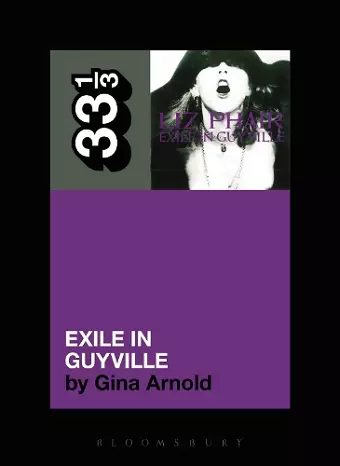Liz Phair's Exile in Guyville
Format:Paperback
Publisher:Bloomsbury Publishing PLC
Published:17th Jul '14
Currently unavailable, and unfortunately no date known when it will be back

A passionate re-assessment of one of the most original, groundbreaking, and controversial albums of the 1990s.
Although "Exile in Guyville" was grudgingly celebrated as one of 1990's top records by "Spin" and the "New York Times", it was also some people's idea of an abomination: a mockery of the Rolling Stones' revered record and a rare glimpse into the psyche of a shrewd, independent, strong young woman. This title presents a re-assessment of this album.
Although Exile in Guyville was celebrated as one of the year's top records by Spin and the New York Times, it was also, to some, an abomination: a mockery of the Rolling Stones' most revered record and a rare glimpse into the psyche of a shrewd, independent, strong young woman. For these crimes, Liz Phair was run out of her hometown of Chicago, enduring a flame war perpetrated by writers who accused her of being boring, inauthentic, and even a poor musician.
With Exile in Guyville, Phair spoke for all the girls who loved the world of indie rock but felt deeply unwelcome there. Like all great works of art, Exile was a harbinger of the shape of things to come: Phair may have undermined the male ego, but she also unleashed a new female one. For the sake of all the female artists who have benefited from her work—from Sleater-Kinney to Lana Del Rey and back again—it's high time we go back to Guyville.
I found this book to be, like Ms. Phair’s album, charming and brave and unexpectedly moving. The author is excellent on so many things, including how the power of Ms. Phair’s songs grows from their grainy details, quotidian observations that other rockers so rarely give us, about things like housework and roommates and 'what is was like to feel voiceless and powerless in a nightclub, on a road trip, or during sexual intercourse. -- Dwight Garner * The New York Times *
Arnold is a wonderful writer: fearless, precise, full of doubt, never taking anything for granted. She’s one of the few people left on the planet who uses presently correctly, which can create its own thrill. Going back to Liz Phair’s once notorious, now often forgotten, absurdly in-your-face ambitious first album—'a story about a girl and a time and a place,' the indie-rock world of Wicker Park, in Chicago, in the early 1990s, but in Phair’s hands a story told with such heart that you need no such details to catch every shade of meaning and emotion—Arnold has written a book about the past ('when dinosaurs, as personified by Dinosaur Jr., ruled the earth'), its follies and crimes ('Every past is worth condemning,' Arnold quotes Nietzsche, and then puts the words to work), and the idea of an imagined community that the past leaves behind ('Often I think I am a better informed citizen of Middlemarch, Bartsetshire,' Arnold says, 'than I am of San Francisco'). And it’s about what it means for a young woman to simultaneously take on both everyone in her town and take down the album that sums up everything that everyone in her town would like to sound like, look like, act like, be—to take down a whole way of being in the world. -- Greil Marcus * The Believer *
Writing at length about two themes – ‘third-wave feminism’ and the changing nature of indie music over the past twenty years - requires laborious research, cogent arguments, and logical grounding from start to finish. Doing so in the context of one record makes the task even more difficult. I can say, having reviewed many scholarly articles in my time, that Arnold passes the test with flying colors. The book is well cited, filled (but not overwrought) with pertinent facts, and her points are structured in a way that just make sense. In a word, the book is smart. * 2bit Monkey *
Mentioned in Harper's Bazaar -- Hannah Morrill * Harper's Bazaar *
Provocative in all the right places, persuasively argued and certainly among the most professional of the series. It reminds me how much my thinking about gender and sexuality has benefitted from reading women’s testimonials to the emotional power of Guyville. It also reminds me how, to this day, I would drink Liz Phair’s bathwater. -- Kirk Curnutt * Paste Magazine *
Arnold’s book puts Phair in her proper place as the patron saint of f**k you. Because, in the end, Phair had the last laugh. Guyville is no more. It has been laid waste, in part, by the corporate interests that poached and commodified indie rock’s talent (Phair included), and finally blasted into oblivion by technology. The critic, like those denizens of Guyville, no longer needs to impress us with her encyclopedic knowledge of a musical act, or lay forth great truths and judgments for us to accept without question. Rather, she can engage in a more lyrical form of storytelling, picking apart at the edges of a work of art, and letting biography and theory bubble forth as need be, in order to reveal a particular, individual relationship. In this way, Arnold’s book not only documents a lost world. By presenting an engaging and enlightening example of criticism in the post-critical age, it also points a way forward. -- Brian Gresko * The Rumpus *
ISBN: 9781441162571
Dimensions: 164mm x 120mm x 8mm
Weight: 120g
136 pages